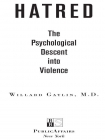Hatred by Willard Gaylin (best manga ereader txt) 📗

- Author: Willard Gaylin
Book online «Hatred by Willard Gaylin (best manga ereader txt) 📗». Author Willard Gaylin
9
THE PSYCHOTIC AND THE PSYCHOPATH
Human beings are unlikely to develop into either villains or heroes. Nor are we for the most part psychotic or psychopathic. Most of us spend our lives living and acting in that generously broad environment called normal. When confronted with the rare extremes of human perversity, we are forced to re-examine our attitudes about ourselves and our species. When we are exposed to true evil, our first tendency is to turn away or explain away—to deny or rationalize. But true evil must be faced. We must examine the acts of terrorism and try to understand the kind of people who are prepared to commit them.
In this chapter I describe two sets of behavior that are beyond the borders of normalcy, psychosis and psychopathic behavior. Both are involved with hatred. These two behaviors are often conflated because of the confusing terminology. They must be differentiated. They represent entirely different conditions that have different degrees of culpability and demand different forms of action.
I will not attempt to offer a definitive discussion of a paranoid psychosis here.38 The appalling examples of hatred and human massacres witnessed in the past century and discussed in this book are not functions of rampaging madmen. Madness does not ordinarily lend itself to such organized behavior. It is the nature of the paranoid schizophrenic to avoid groups—not organize them. The purpose of discussing the paranoiac is that, as is often the case, it is easier to grasp the fundamentals of a condition at its extreme. The terrorists of Al Qaeda have been indoctrinated with paranoid ideas, but they are for the most part not psychotic. The individual, “self-employed” terrorist is usually a paranoid schizophrenic.
The Psychotic
Paranoia is the psychosis that is involved with acts of hatred. It is characterized by the formation of delusions and, in rare cases, hallucinations. The delusions fall into two seemingly contradictory categories: delusions of persecution and delusions of grandeur. A delusion is a false belief that entails an abandonment of all reality testing. A hallucination is a false perception often auditory—voices or radio messages from another planet—or visual and tactile hallucination, as with the creeping insects that plague an alcoholic in delirium tremens.
While many hallucinations are chemically triggered, a delusion can still be understood in the same model used for lesser symptoms—as a coping mechanism, a misguided repair. A genetic predisposition, a chemical imbalance, and a dynamic explanation are not mutually exclusive mechanisms. As described previously in my analogy with music (see chapter 3), they must be viewed as different frames of references, different languages, brought to bear in an attempt to shed light and bring understanding to a complex human experience.
A psychotic delusion is one of the most bewildering and intriguing of symptoms. Grotesque as it may seem, it still subscribes to the general rule of a symptom as an attempt to control overwhelming anxiety. The repair is a costly one; delusions are the most destructive of symptoms, since they demand a true suspension of reality testing. To be certain that God is directing you to a specific mission of destroying known agents of the devil—or to actually believe that you are God—is to suspend belief in the real world beyond what normal self-deceptions require. Because this distortion in thinking is central to the various forms of schizophrenia, they have been referred to as thought (or thinking) disorders. Schizophrenia is one major subdivision of psychotic behavior. Affective (emotional) disorders, like depression, constitute the other category.
How could such bizarre ideation serve the purposes of daily life? It does so in the same way that avoidance serves the phobic. It offers a method of controlling, limiting, and rationalizing a free-floating and all-pervasive anxiety. Anxiety is the price we pay for the human capacity to anticipate the unknown future.
We tend to use words in everyday speech differently from the way psychiatrists use them. We say we feel anxious about an oral examination, job interview, or performance that is about to take place. Psychiatry would consider that worry. Psychiatrists distinguish anxiety from worry, reserving the latter for the emotion consequent to some impending and potentially dangerous event—a job interview, the need to enter a dark, enclosed space. Anxiety is reserved for a form of dread that has no immediately apparent stimulus. Since it exists without awareness of any threatening source or justification, it is labeled “free-floating anxiety.” At one time or another most of us have experienced free-floating anxiety, an unknown dread that produces an edginess or even agitation.
Imagine a person, however, whose life is suffused with an overwhelming, constant, and pervasive free-floating anxiety. His life will be almost unmanageable. Here is where psychotic delusion formation may offer relief. If the psychotic makes the break from reality, he may delusionally decide, for example, that the person he most trusts, his mother, is not the person he thought she was, but an agent of his enemies. She is trying to poison him. This delusion rationalizes his anxiety. He is not crazy. It is logical and natural to feel frightened in the face of direct attempts on one’s life.
In addition, the delusion universalizes his experience, thereby relieving his feelings of being strange or different; any rational person would feel anxious in these circumstances. Finally the symptom controls the anxiety by limiting its locus and focus. He need not feel anxious except when he is home and even then only when he is eating. He can control the anxiety by not eating the food prepared, or by taking precautions to make sure that his portions were not tampered with. This salvages time and energy to pursue his other normal activities. He controls the formerly all-pervasive anxiety by focusing it into one area of life rather than allowing it to spill over and contaminate all areas.
A delusion need not be simply the product of anxiety. It may be triggered by an immense rage, an overwhelming sense of shame





Comments (0)